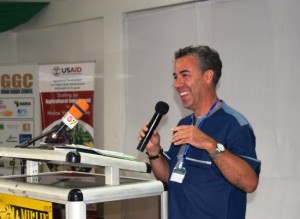USAID, GGC hold first agric pre-harvest event for Southern Ghana

The United States Agency for International Development (USAID) and the Ghana Grains Council have hosted the first Annual Southern Ghana Agribusiness Pre-Harvest Event in Kumasi.
Agriculture stakeholders such as lending institutions, agribusinesses, development organizations and farmers reportedly convened in Kumasi to discuss topics such as agricultural lending, farmer-buyer collaboration and the maize marketplace.
According to a statement from USAID copied to ghanabusinessnews.com, the event brought together more than 300 maize and soybean farmers, processors, agro input dealers and others, to discuss pertinent issues, forge partnerships, and develop market linkages.
The event is modelled alike to the pre-harvest events that USAID holds regularly in northern Ghana.
USAID says the last pre-harvest event was held in Tamale in October 2015, and brought together nearly 1,000 farmers, buyers, processors, transporters, input dealers, farm machinery dealers, and financial institutions and mobilized more than 20,000 GHS from 10 private sector sponsors.
“At USAID, we believe that agriculture remains the best means of alleviating poverty and hunger in Ghana. Through President Obama’s initiative on global hunger and food security called Feed the Future, we work to make farming in Ghana more productive and profitable,” Brian Conklin, Deputy Director of USAID Economic Growth Office was quoted as saying.
“This pre-harvest event is critical to these goals because it brings so many key players from the south’s agriculture sector together to learn from each other and form partnerships.”
The pre-harvest event was organized through USAID’s Agricultural Development and Value Chain Enhancement (ADVANCE) project, which is part of Feed the Future – the American government’s hunger and food security initiative, which works around the world to eliminate extreme poverty, malnutrition and hunger.
According to USAID, Feed the Future works in Ghana to increase agricultural productivity, boost the harvests and incomes of rural smallholder farmers, teach families about improved nutrition practices, improve agricultural research and development and help communities better withstand crises like extreme climate events.
By Emmanuel Odonkor
